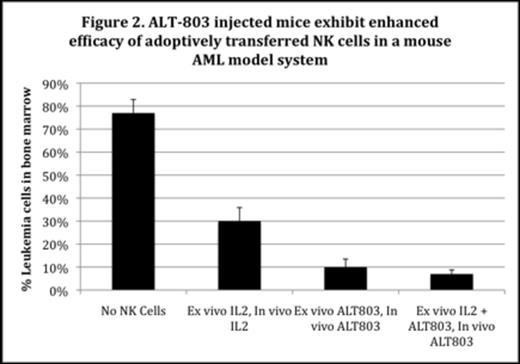Abstract
Introduction:
A crucial component of the innate immune response system, natural killer (NK) cells are uniquely competent to mediate anti-myeloid leukemia responses. NKG2D is an activating receptor on the surface of NK cells that engages stress ligands MICA and MICB, typically upregulated on myeloid leukemia cells. Adoptive transfer of NK cells is a promising treatment strategy for AML. Strategies to optimize the anti-leukemia effect of NK cell adoptive transfer are an area of active research. These include attempts to enhance NK cell activity and to maintain the activation status and proliferation of the NK cells in vivo.
Traditionally, IL-2 has been used to maintain the in vivo proliferation of adoptively transferred NK cells, but it leads to unwanted proliferation of regulatory T cells and suboptimal NK cell proliferation. IL-15 may be superior to IL-2, without the effects on T regulatory cells. The IL-15 superagonist, ALT-803 exhibits >25 fold enhancement in biological activity as compared to IL-15. ALT-803 is a fusion protein of an IL-15 mutant and the IL-15Rα/Fc complex that has recently entered clinical trials as a direct immunomodulatory agent in cancer clinical trials We hypothesized ALT-803 would augment the activity and/or proliferation of adoptively transferred NK cells in vitro and in a mouse model system..
Methods:
Human NK cells were isolated from healthy donor peripheral blood and were expanded over a 21-day period in co-culture with irradiated K562 cells genetically modified to express membrane-bound IL-21. (Somanchi et al. 2011 JoVE 48. doi: 10.3791/2540) The NK cells were expanded with IL-2 (50mU/mL) and/or ALT-803 (200ng/mL). On Day 21, NK cells were examined for cytotoxicity against AML cells as well as by flow cytometry for expression of known activating receptors.
An NSG murine xenograft model of human AML was developed to test the in vivo function of NK cells expanded above. Briefly, NSG mice (n=5 per group) were non-lethally irradiated and each injected IV with 5 x106 OCI-AML3 leukemic cells. Two days later, each mouse received weekly NK cell infusions for 2 weeks. Mice that received NK cells expanded with IL2 got cytokine support with IL-2 (75kU IP three times a week). Mice infused with ALT-803 expanded cells (alone or in combination with IL2) received ALT-803 (0.2mg/kg IV weekly). One control group received OCI cells but were infused weekly only with 2% FBS vehicle, no NK cells. Leukemic burden in each mouse was assessed by flow cytometry of bone marrow aspirates on day 28 following start of NK cell infusions). This time point was chosen as the control mice appeared moribund.
Results:
ALT-803 did not have any differential effect on the proliferation of the NK cells ex vivo as compared to IL-2. However, the presence of ALT-803 either alone or in combination with IL-2 resulted in a significant increase (30% increase, p<0.0001) in the cytotoxic activity of the NK cells against leukemia cells as compared with IL-2 alone in vitro (figure 1). In addition, the percentages of NK cells that express the activating receptor NKG2D as well as CD16 were significantly higher (p<0.001 for both) after ALT-803 exposure (figure 1). Finally, in the murine xenograft AML model, ALT-803 expanded NK cells, which were also supported in vivo with ALT-803, resulted in an 8-fold reduction in disease burden in the bone marrow (p<0.0001). Importantly the efficacy of NK cells in the ALT-803 injected mice was significantly higher (3-fold, p= 0.0447) than IL-2 treated mice (figure 2).
Discussion:
Our results suggest that the presence of ALT-803 during ex-vivo expansion of NK cells results in increased activation and cytotoxicity against AML cells. In addition our results using a murine model of human AML show that the use of ALT-803 in combination with adoptively transferred NK cells provides a significant anti-leukemic benefit as compared to IL-2. Future studies to test larger panels of leukemia cells as well as other cancer cell lines are currently in progress. It is hoped that this work will lead to an improvement in the efficacy of adoptively transferred NK cells for AML patients due to an improvement in survival and activity of the NK cells.
Wald:Invenio Therapeutics: Equity Ownership.
Author notes
Asterisk with author names denotes non-ASH members.



